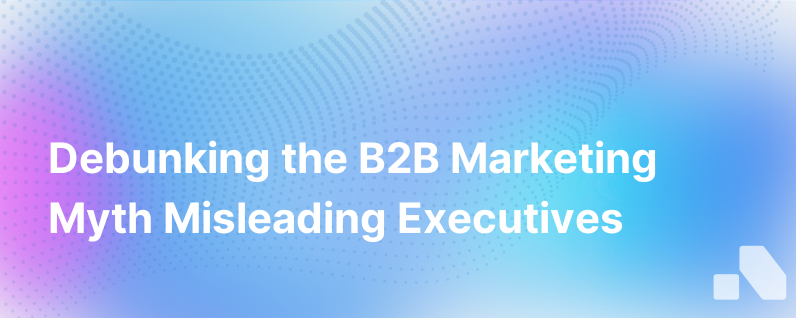
There's a pervasive, stubborn myth in B2B marketing that's had a stronghold on the industry for too long. It's the notion that B2B buying decisions are purely rational, guided only by structured criteria like price, functionalities, and ROI. And as a result, marketing strategies must be as dry and serious as the suspected audience. But let’s think about it - are businesses not run by people, after all?
Here we debunk this outdated belief and champion a more nuanced approach that considers the emotional and relational aspects of B2B marketing.
The Misconception of Pure Rationality
One of the core tenets of this myth is that B2B transactions are immune to the emotional and storytelling elements that are so successful in B2C marketing. The assumption is that B2B buyers are logic-driven machines, methodically sifting through data, unswayed by anything as trivial as 'brand personality' or 'emotional engagement'. But decision-makers are human beings, not unfeeling robots.
Humans are inherently emotional creatures, and numerous studies in psychology and behavioral economics have shown that emotions significantly influence decision-making processes. Even in B2B settings, where decisions might involve complex, high-stakes dealings, the final choices are often heavily guided by trust, confidence, and the relationship between buyer and seller.
The Underrated Role of Emotion in B2B
Think about it: when making a significant investment in a product or service for your company, do you go for the provider you trust and feel good about, or the one that leaves you cold, no matter how good the specs look on paper?
Emotions such as trust, credibility, and a sense of security play a significant role in the purchasing process. Emotional branding and storytelling can thus be powerful differentiators in a space where competitors often offer similar services. A narrative that ties the product to success, growth, or security can create a visceral connection that tilts the scales when all else is equal.
Storytelling and Human Connection
Brands that have leveraged emotive storytelling often see more engagement and better results in their marketing efforts. By telling a story, you’re not just selling a product or service; you're offering a vision, a promise, or a journey that the prospect can become a part of. It's about showing understanding and empathy towards their challenges, hopes, and dreams.
A classic example of emotive storytelling in B2B marketing is the 'Fearless Girl' campaign commissioned by investment firm State Street Global Advisors. The statue of a girl standing defiantly against Wall Street's Charging Bull not only addressed gender diversity but also carried a potent emotional message about resilience and the future of leadership.
Reframing the Narrative with Content
Quality content that engages and informs is essential, but how it's framed can make all the difference. Instead of only highlighting features and functionality, content should speak to the reader's aspirations, challenges, and professional values. This reframing can convert a dull specification sheet into a dynamic story of innovation, growth, or security.
Forbes also points to how Adobe has managed to implement emotive storytelling effectively through its "Adobe &" campaign, positioning Adobe as a partner in creativity and business success, and not just a software provider.
Social Proof and Influence
Social proof is another area where emotion plays a crucial role. People trust other people, so testimonials, case studies, and customer success stories can provide a more significant persuasive edge than any statistic or product comparison. Buyers want to see and feel the success of their peers and envision the same for themselves.
Breaking the Myth with Data-Driven Insight
If the notion feels a bit too airy-fairy, let's bring it back down to earth with data. Research done by the Google and CEB's Marketing Leadership Council, featured in the book The Challenger Sale, revealed that B2B customers are significantly more emotionally connected to their vendors and service providers than consumers.
Furthermore, a study by LinkedIn and TNS found that B2B buyers consider the "emotional ROI" ahead of the financial ROI, suggesting that how the solutions they purchase make them feel is critical.
Aligning with Modern Marketing Techniques
As B2B marketing evolves, adopting tactics traditionally seen in the B2C realm can be effective. Techniques such as influencer partnerships, community building, and experiential marketing can and do resonate with professional audiences when applied thoughtfully.
Conclusion
The myth of B2B buyers as dry, emotionally detached entities is outdated and detrimental to building effective marketing strategies. Business buyers respond to the same human emotions as any other customer. Evolving your B2B marketing strategy to reflect this will not only set you apart but will resonate more deeply with your audience, forging stronger connections and leading to sustained business.
As businesses increasingly look for products that not only meet their functional needs but also resonate with their corporate identity and values, it’s incumbent upon savvy B2B marketers to weave emotional and relational elements into their strategies. Achieving this balance is what Aomni is designed for–bridging data-driven sales intelligence with an understanding that behind every business transaction, there's a human story to be told.
Implementing a B2B marketing strategy that synthesizes emotional appeal with traditional sales intelligence is not about abandoning data or ROI calculations. It’s acknowledging the comprehensive nature of decision-making. Addressing both the analytical and the emotional, the figures, and the stories, can create a holistic marketing narrative that captivates your audience and elevates your brand in the corporate world.